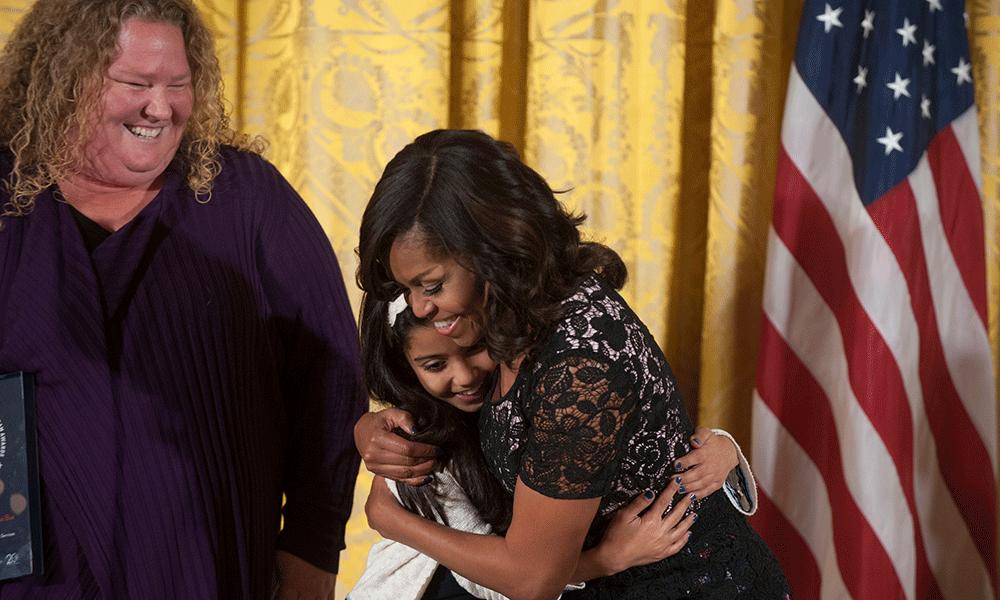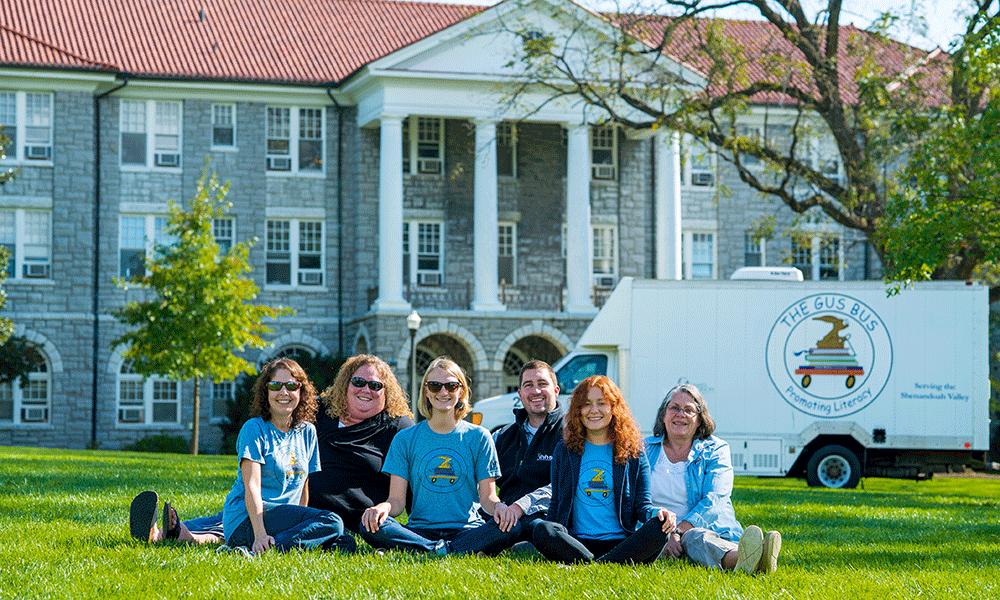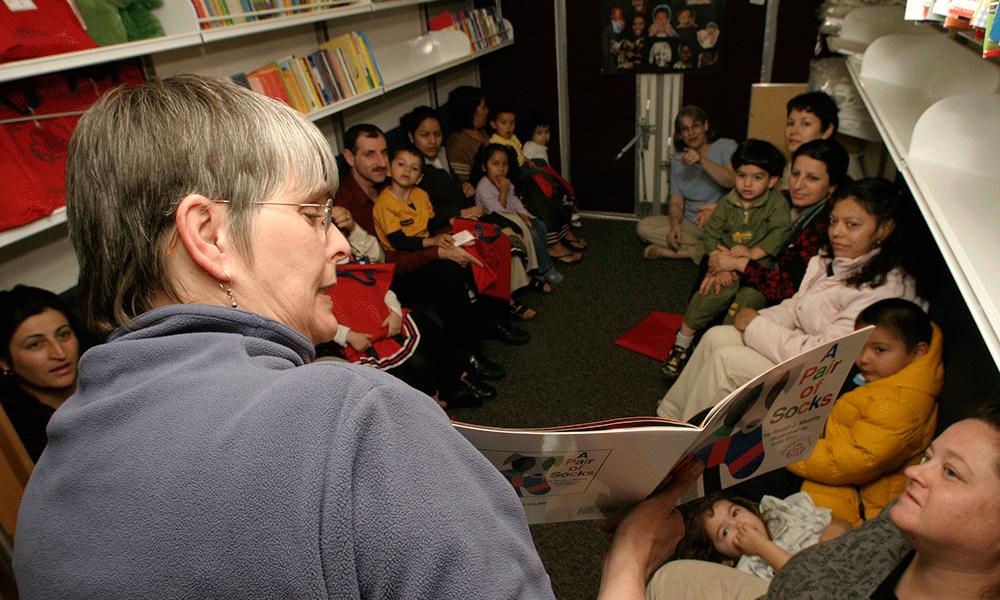The Gus Bus stops at the White House
JMU in the Community
SUMMARY: The Gus Bus is a great example of how community engagement can work. Its focus on literacy and the importance of literacy in a meaningful life contributed to receiving a National Arts and Humanities Youth Program Award.
On Nov. 15, JMU's Reading Road Show/Gus Bus Program received a National Arts and Humanities Youth Program Award, one of 12 U.S. programs the President's Committee on the Arts and the Humanities recognized for outstanding after-school and out-of-school programs that are transforming the lives of young people throughout America. The prestigious award recognizes a beloved fixture of Madison's community engagement efforts. Under the auspices of JMU's Institute for Innovation in Health and Human Services, the Reading Road Show is one of many programs of the Office on Children and Youth, which coordinates services for area youth throughout the Shenandoah Valley.
In 2003, as office staff members, educators and various community organizations analyzed community data on kindergarten readiness, they pinpointed a disturbing trend. "We saw that half of all area kids were coming into school not ready to learn for a variety of reasons, including low socioeconomic status and parents whose first language was not English," says Kim Hartzler-Weakley ('00, '07M), coordinator of Children and Youth Services at JMU. Jane Hubbell, the director of the Office on Children and Youth from its inception in 1998 through 2008, had an innovative idea—take literacy efforts out into the neighborhoods that had the highest need for such services. Pat Kennedy ('77, '82M) worked with Hubbell to turn the idea into the Reading Road Show, which was essentially a mobile literacy unit. A customized vehicle, the Gus Bus, hit the road, with Kennedy serving as the founding coordinator of the program.
While the original focus of the Reading Road Show was on children 5 years old and younger, it soon became apparent that those children were not coming to the Gus Bus by themselves; their older siblings were bringing them. "We realized we needed to have more services and focus on elementary-school-age children," says Hartzler-Weakley.
Today the program has two buses on the road every day of the week, serving neighborhoods where transportation is an issue for residents and parents are often doing shift work. "We eliminate the barriers for students to engage in quality out-of-school learning," says Michael Maurice ('08, '13M), the current director of the Office on Children and Youth. The program partners with area schools to determine neighborhoods where the Gus Bus can be most effective. "The Reading Road Show distributes schedules and provides posters to the schools so the information is available to children and parents as to when the bus is coming," says Jolynne Bartley, program coordinator.

|
Twelve-year-old Sarah Hussein, who accompanied Hartzler-Weakley to the White House to accept the award, is one of many youth who have been impacted by the Reading Road Show. When Hussein and her family arrived in the U.S. as refugees from Iraq in 2013, she spoke no English. "Coming on the Gus Bus twice a week helped her learn English," says Hartzler-Weakley. "She's now helping her siblings and younger kids who come on the bus." In fact, the program's longevity has created a legacy for many area families. Bartley says, "Older children have now grown up with the Gus Bus and frequently bring in their younger siblings."
The Gus Bus is more than a mobile library; it serves as a classroom on wheels.
"It's always staffed with a literacy specialist as well as four to six JMU student volunteers," says Hartzler-Weakley. And neighborhood stops are just one component of the Reading Road Show. The program places JMU students as tutors for area children one-on-one in their homes and after school, sponsors after-school enrichment at Stone Spring Elementary and Spotswood Elementary, and partners with the Boys & Girls Club for after-school programming and summer enrichment.
JMU students preparing for careers in various disciplines—education, health and nutrition, nursing, business, social work, Spanish—have volunteered on the Gus Bus. "They provide important one-on-one time for children. Many kids needing additional support have someone to sit with them and talk them through assignments, repeat things, clarify things," says Hartzler-Weakley. "JMU students benefit as well. They can take concepts from their classrooms and apply them in the real world. They get to see what life is like when you step off campus."
The only NAHYP 2016 awardee that is a humanities program, the Reading Road Show competed with over 300 applicants for the award. "This was the first time we submitted an application," says Maurice. "Many applicants have tried repeatedly, so we're very excited about our success."

|
The award provides $10,000 of unrestricted funds for the Gus Bus. In addition, the President's Committee on the Arts and the Humanities provided awardees with extensive training on applying for even bigger grants. "They connected us with groups that have money to fund programs like ours. We've already identified a few good matches that we'll be applying for in the upcoming year," says Hartzler-Weakley.
Those funds, along with increased individual and corporate contributions, will help solve a big challenge for the Reading Road Show. "One of our buses was purchased in 2003, the other in 2005, and they have a lot of miles. We need to be looking ahead. We need new vehicles. We'd like to expand more fully into Page County and ultimately into Shenandoah County," says Hartzler-Weakley.
"There's real innovation to what we're doing," she says. "Our focus on literacy and the importance of literacy in a meaningful life contributed to receiving the award. … It's a great example of how community engagement can work."
